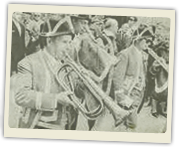 A hundred years ago, the Wind Band Contest of 1924 was held in the bullring on
Calle Játiva during the first two days of August. A total of ten bands took part
in the Contest: six in Division Two and four in Division One. The Banda Municipal
de Valencia and the Banda del Real Cuerpo de Guardias Alabarderos de Madrid appeared
as guest ensembles to close both days of the Contest.
A hundred years ago, the Wind Band Contest of 1924 was held in the bullring on
Calle Játiva during the first two days of August. A total of ten bands took part
in the Contest: six in Division Two and four in Division One. The Banda Municipal
de Valencia and the Banda del Real Cuerpo de Guardias Alabarderos de Madrid appeared
as guest ensembles to close both days of the Contest.
The Contest began early in the afternoon on 1 August with the customary procession of
the participating bands towards the bullring to the sound of pasadobles and the applause
of numerous spectators.
At five o’clock the jury was convened. Its members were: Juan Cortés Cortés, a tutor at
the Conservatorio de Valencia; Pedro Sosa López, a Valencian composer and tutor at the
Conservatorio de Valencia; and José María Navarro Ros, Director of the Banda del Regimiento
Mallorca No. 13 from the Murcia garrison. Once the jury had been convened, the parade inside
the bullring began.
The six bands taking part in Division Two performed their compulsory piece, the “Danse des
Bacchantes” from the comic opera PHILEMON ET BAUCIS by the French composer Charles Gounod.
Then the four bands in Division One each played their free-choice piece. The first day’s
competition was brought to a close with a performance by the 70 musicians of the Valencia
Municipal Wind Band conducted by Luis Ayllón Portillo and a performance by the Banda del Real
Cuerpo de Guardias Alabarderos de Madrid, with 45 musicians and conducted by Emilio Luis Vega
Manzano, the former director of the Banda Municipal de Valencia.
The second day of the Contest began in the same way as the previous day with the parade of
participating bands through the streets of Valencia to the bullring. Once the jury were seated,
the parade of bands around the arena began at five o’clock. This was followed by the bands from
Division One taking to the stage to perform their compulsory piece, A SUMMER DAY IN NORWAY by the
German composer Rudolf Willmers. Then the bands in Division Two each played their free-choice piece.
The contest was brought to a close by a performance by the Banda Municipal de Valencia and the Banda
del Real Cuerpo de Guardias Alabarderos de Madrid. The Contest ended at around ten p.m.
At midnight the decisions of the jury were announced in the Pabellón Municipal de la Feria located on
the Paseo de la Alameda. The results were as follows:
The prizes awarded in Division One were as follows: First Prize and 4,000 pesetas were awarded to the
55 musicians of the “Unión Musical” de Líria and its conductor, Eduard Felip Suárez, who performed
“Les Préludes” by Franz Liszt. The First Accessit Prize and 2,500 pesetas went to the 64 musicians of
the “Primitiva” de Líria and its conductor, Félix Soler Villalba, who performed the “Polovtsian Dances
from Prince Igor” by Alexander Borodin. The Second Accessit Prize and 1,500 pesetas was won by the 53
musicians of the “Ateneo Musical Obrero” de Torrente and its conductor, José María Rius Lerma, who
performed the “Rapsodia Manchega” by Emilio Luis Vega Manzano.
The “Unión Musical” de Carcagente, with 57 musicians and conducted by Emilio Seguí Ripoll, who performed
the “Jubilee Overture” by Carl Maria Von Weber, was disqualified from Division One.
The prizes in Division Two were as follows: First Prize and 2,000 pesetas were awarded to the 40 musicians
of the “Sociedad Instructiva Musical” de Benimaclet and their conductor, Manuel Belando Martínez, who
performed “Andalucía” by Eduardo Escobar de Rivas. The First Accessit Prize and 1,750 pesetas went to the
40 musicians of the “Artística Musical” de Alginet and their conductor, Pascual Pérez Choví, who performed
the “Don Giovanni” overture by Wolfgang Amadeus Mozart. The Second Accessit Prize and 1,000 pesetas were
won by the 40 musicians of the “Victoria” de Alcudia de Carlet and their conductor, José García Pastor,
who performed the “Euryanthe, Op. 81” overture by Carl Maria Von Weber.
The following bands were disqualified from Division Two: the 40 musicians of the Sociedad Musical “Granados”
de Quartell who were conducted by Ramón del Valle Alvira and performed the “Monte Arruit” overture by Ramón
del Valle Alvira; the 39 musicians of the “Antigua Sociedad Musical” de Faura and their conductor, Manuel Muñoz
Villanueva, who performed “Le Lac des Fées” overture by Daniel François Esprit Auber; and the 40 musicians of the
“Banda Municipal” de Antella and their conductor, Amadeo Gascó Camarena, who performed the “Egmont, Op. 84” overture
by Ludwig Van Beethoven.
In this edition of the Contest there was no pasodoble prize and audience ticket fees were higher than they are today.
Prices ranged from 1 peseta for a “general admission” seat in the sun, to 20 pesetas for a private box which included
six tickets for each performance. A “general admission” ticket in the shade cost 2.50 pesetas; a seat towards the front
of the second and first highest tiers of seating and in rows behind the ringside seats cost 4 pesetas; and seats in front
of the boxes in the second tier of seating, ringside barrier seats and aisle seats cost 5 pesetas.
Una Historia Irrepetible en el Mundo Musical
Certamen Internacional de Bandas de Música Ciudad de Valencia
Alfredo Ruiz Cerveró